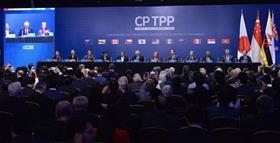
Fresh produce companies and representative bodies are among those to welcome the signing of the Comprehensive and Progressive Agreement for Trans-Pacific Partnership (CPTPP) in Chile on Thursday (8 March).
While six of the 11 participating countries still have to ratify the trade pact, having all member nations signing on has been heralded as an important step in the deal's implementation.
The agreement was on shaky ground last year when US President Donald Trumppulled his country from negotiations for what was then known as the Trans-Pacific Partnership (TPP). The remaining nations – New Zealand, Australia, Brunei, Canada, Chile, Japan, Malaysia, Mexico, Peru, Singapore and Vietnam – remained committed to the deal and have not ruled out the possibility of other nations joining the agreement in the future.
The current signatories have a combined GDP of over US$13 trillion, representing 13.5 per cent of the world's GDP.
For the fresh produce industry, the CPTPP provides preferential market access for suppliers targeting fellow member nations.
For New Zealand’s kiwifruit industry, the CPTPP will eliminate tariffs on its shipments to all 11 signatory nations, with single-desk marketer Zespri saying the move will have particular benefit for trade into Japan.
Having already been one of its top markets for volume and value over the last two decades, Zespri is tipping sales volumes to Japan will increase by around 25 per cent over the next five years.
“We see the benefits most clearly in Japan, where New Zealand kiwifruit growers paid over NZ$26m in tariffs last season,” said Zespri chief executive Dan Mathieson.
“This tariff relief will means savings for our growers and benefits for Japanese consumers by supporting our competitiveness against other fruit in market.”
Mathieson said the other countries in the agreement either do not have tariffs on kiwifruit, have existing free trade agreements with New Zealand or do not currently import New Zealand kiwifruit.
Mike Chapman, chief executive of Horticulture New Zealand,said tariffs on New Zealand apples would be eliminated over 11 years across member nations, putting the industry on a level playing field with Australia, which already has preferential access to Japan.
Chapman also highlighted the importance of New Zealand’s participation in the agreement from an economic stand point.
“If the CPTPP went ahead without New Zealand, the modelling estimates a $183 million decline in our gross domestic product (GDP),” he said.
'As it stands, the deal’s worth to New Zealand is a rise of between $1.2 and $4 billion in GDP. It better links us to four of New Zealand’s top 10 trading partners in Australia, Japan, Singapore and Malaysia, which account for 30 per cent of New Zealand goods that are exported.”
Australian minister for agriculture and water resources, David Littleproud, said the trade deal would have an immediate benefit for exporters and create opportunities in two new markets, Canada and Mexico, which have a combined population in excess of 470m. He also expected the agreement to provide leverage for market access negotiations in key Asian markets.
“This is the world’s largest ever regional trade agreement, creating huge opportunities for our beef, sheep, dairy, sugar, wool, wine and horticulture producers in current and new markets,” Littleproud explained.
“Into Japan, Australia is seeking to regain access for blueberries and improve market access for other horticulture commodities, including mangoes.'



